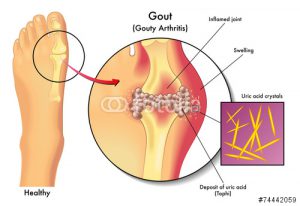Gout

Most Rheumatologists agree that in the general practice medical community, the most commonly misdiagnosed and improperly treated of all the rheumatic illnesses is gout.
Rheumatologists specialize in accurately diagnosing and properly treating this painful illness. Gout is common to begin with, and as the US population ages, and as we observe increases in obesity, poor dietary habits, alcohol consumption, high cholesterol, and high blood pressure in our society, and the increasing presence of high fructose corn syrup in our foods, the incidence of gout is going up.
Unfortunately, all of the following scenarios are common amongst gout patients who do not receive care for their gout from a Rheumatologist:
- Patients who do not have gout are often misdiagnosed as having it, and are given medications that are not necessary, do the patient no good whatsoever, and could be harmful.
- Patients who actually do have gout are often misdiagnosed as having something else. Thus they continue to suffer attacks, they get medications they do not need and which do them no good, and they remain at risk for complications of gout (read on).
- Patients who actually do have gout, and whose doctor correctly diagnoses it, are improperly treated, under-treated, or over-treated. The result is recurrent attacks of the most painful arthritis there is, and/or undesirable drug side effects. If you have gout, it is important for you to know that.
With today’s medications and diagnosis techniques, almost ALL cases of gout, as well as carpel tunnel, can be treated so that the kidneys are protected from further damage and kidney function may actually improve, recurrent attacks of gout in the joints do NOT occur, gout’s co-morbidities (diseases that go along with gout) are minimized, and medication side effects are avoided. The truth is, you do NOT have to continue to suffer from gout! Get thee to a Rheumatologist, and if you live in Southcentral Wisconsin, get thee to Dr. Malone!
Proper treatment of gout is important for more than just avoidance of painful attacks of arthritis. Gout has a variety of what are known as co-morbidities, which refers to the many other illnesses that are known to be associated with gout. The most important of these, which comprise a group of diseases known as “METABOLIC SYNDROME” are:
- Hypertension (high blood pressure)
- Obesity
- Diabetes
- Heart artery and other artery blockages
- High cholesterol and other lipids
- Deterioration of kidney function
- Depression
- Chronic pain conditions
- Frozen shoulder
- Carpal tunnel syndrome
Untreated or incorrectly treated, gout can also lead to a variety of other illnesses such as kidney stones, and tophi, which are unsightly collections of uric acid crystals that form just beneath the skin and can ulcerate, ooze white chalky material and become infected. As is evident, proper control of gout and keeping the levels of uric acid in the patient’s blood within a specified range, are very important in minimizing the risks from the illnesses on the list above.
